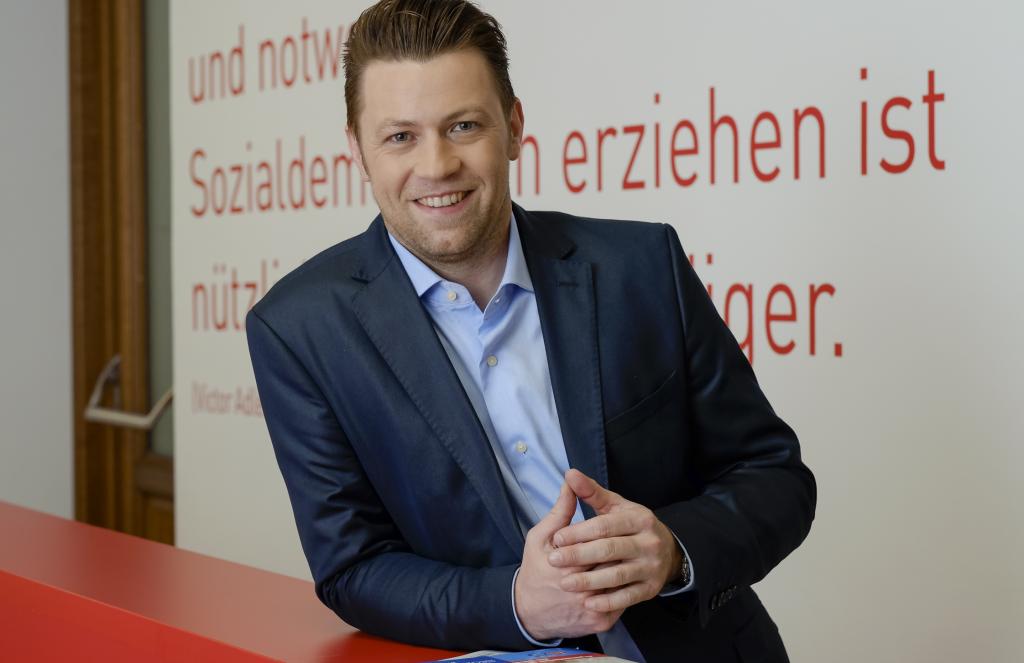Thessaloniki gets ready for its metro launch in November
The underground rapid transit lines have been under construction for almost two decades due to various project delays
 TheMayor.EU logo
TheMayor.EU logo 
Member of the State Parliament Marcus Schober / SPÖ Vienna, Source: Henisch on Wikipedia (CC BY-SA 4.0)
Interview with Marcus Schober, Member of the Vienna State Parliament and City Council of Vienna
Marcus Schober was born on 13 September 1980 in Vienna’s Ottakring district. He has trained as telecommunications, information and press officer and communication trainer for the Austrian Armed Forces. He has also studied Journalism and Communication Science, as well as Political Science at the University of Vienna.
He is a member of the SPÖ and has worked in government since the year 2000 when he started participating in various election campaigns. He was sworn to parliament in Vienna in February 2015 and is a member of that body and the Vienna City Council, taking part in various workgroups and committees.
Some of his more notable functions are in the municipal council committee for Education, youth, integration and transparency and Municipal Council Committee for Housing and Urban Renewal.
There are a lot of aspects of my work which I enjoy a lot, such as various committees, especially on Education and Safety, yey the highlight of my work has to be the people. I get to meet and interact with people from all walks of life while trying to improve my hometown. To me, it doesn’t get much better.
The pandemic hit everyone hard, especially the youngest ones in our society. According to a study, half of all school children suffered from depressive symptoms during the pandemic, which are problems on a scale that we have not faced before. To overcome them two things were necessary: First: to slowly transition back to “normal” life and second, to invest even more in Education and our youth, especially with regards to mental health.
As I mentioned it severely impacted their mental health. Not being able to socialise deeply impacted our youth. Studying and learning social dynamics is just as, if not more important than studying algebra, and they completely missed out on that for almost two years. Additionally, it is harder to teach children through a computer than in a classroom so in general, education suffered as well.
Now that the health crisis will, hopefully, soon be over, the economic crisis will fully reveal itself. Austria has a record deficit in its budget and filling it without putting families and people at risk will be a complex task.
Our politics aim to provide the best education regardless of the financial background. That is why everything from kindergarten to university is free in Vienna. Education is not a privilege it is a right and here in Vienna and we work to ensure this every single day.
Personally, I think that this will be less of an issue once bars, clubs and other venues are open and young people have a place to go at night. Nonetheless, it is still important that the youth have spaces where they can unwind and express themselves without disturbing other citizens.
We are very proud to be the initiators of various European projects. I have been one of the founding members of River Cities which was started back in 2006. There we are cooperating with 20 other European cities.
Another project is Benchmarking Colours of Love, which encourages people to actively help design their surrounding and environment. Finally, we also have the Red Carpet Award which promotes art and young artists in 8 Countries - since Art and Culture unite people in a way that little else can.
If you want to keep up with how European cities and regions are changing, follow us on Facebook, Twitter and Instagram.

The underground rapid transit lines have been under construction for almost two decades due to various project delays

Now you can get your wine in Talence by paying directly in Bitcoin

That’s because the state has to spend money on updating the railway infrastructure rather than subsidizing the cost of the popular pass

Rethinking renewable energy sources for the urban landscape

The examples, compiled by Beyond Fossil Fuels, can inform and inspire communities and entrepreneurs that still feel trepidation at the prospect of energy transition

Now you can get your wine in Talence by paying directly in Bitcoin

The 10th European Conference on Sustainable Cities and Towns (ESCT) sets the stage for stronger cooperation between the EU, national and local level to fast track Europe's transition to climate neutrality.

At least, that’s the promise made by the mayor of Paris, Anne Hidalgo

The underground rapid transit lines have been under construction for almost two decades due to various project delays

At least, that’s the promise made by the mayor of Paris, Anne Hidalgo

Hostal de Pinós is located in the geographical centre of the autonomous region

Despite its church-y name, the district has long been known as the hangout spot for the artsy crowds

Urban dwellers across the EU are having a say in making their surroundings friendlier to people and the environment.

Forests in the EU can help green the European construction industry and bolster a continent-wide push for architectural improvements.

Apply by 10 November and do your part for the transformation of European public spaces

An interview with the Mayor of a Polish city that seeks to reinvent itself

An interview with the newly elected ICLEI President and Mayor of Malmö

A conversation with the Mayor of Lisbon about the spirit and dimensions of innovation present in the Portuguese capital














